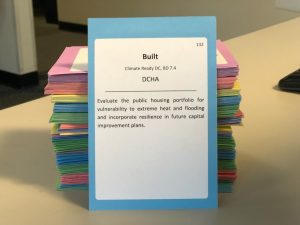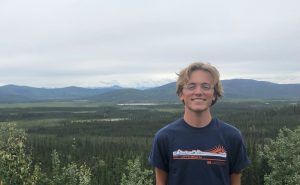My Journey from North Carolina to Studying Disasters in Manchester
This blog has been written by Jacob Graham, who is one of our Taught Master’s bursary winners for the MSc International Disaster Programme at the Humanitarian and Conflict Response Institute (HCRI).
I arrived in Manchester to start the MSc International Disaster Management programme last September. Prior to my arrival, I had never left North America. The opportunity to study abroad was made financially possible through the HCRI Taught Master’s Bursary, which I applied for via the SALC funding application form in February of 2019. By early April, I was very grateful to have been selected for the award. For me, pursuing master’s programme at HCRI was the culmination of varied experiences in disaster management during my undergraduate degree.
Studying in America – I grew up in the suburbs of North Carolina and moved to Washington, D.C. for my undergraduate degree in International Affairs at George Washington University (GW) This was a big move for me at the time however, I wanted to study climate change and pursue a career revolving around mitigation efforts. From this perspective, I chose a major in International Affairs which concentrated in environmental studies and picked a minor in geography. Early on in my degree I realised climate change isn’t only a problem for the future, but a present phenomenon with ongoing consequences for people around the globe. This is where my interest in disasters began.

Example of a mitigation initiative Jacob identified, which was printed onto card and discussed with stakeholders.
Federal internship – For two semesters during undergraduate studies, I interned with Washington D.C.’s Homeland Security and Emergency Management Agency (HSEMA). Initially I assisted with completing the District’s Hazard Mitigation Plan. The Plan is required by the Federal Emergency Management Agency (FEMA) in order for state, tribal, and local governments to receive certain non-emergency grants for mitigation projects. In my role, I reviewed hundreds of ongoing and planned mitigation initiatives from local and federal agencies, non-profits, and other civil society organizations to determine whether they would be presented to stakeholders and reviewed for inclusion in the plan.
In my second semester with HSEMA, I assisted with completing the District’s Threat and Hazard Identification and Risk Assessment (THIRA). Completion of the THIRA is another requirement for certain non-emergency funding from FEMA, with the process comprising of three steps: 1) identifying threats and hazards, 2) estimating the impacts of those threats and hazards and 3) assessing the community’s capabilities in responding to those impacts. In the context of my internship, I assisted with the final step of the process. In a team of three, I interviewed stakeholders from around the District to assess their capacity in responding to pre-determined scenarios. A representative of the Department of Public Works was asked how many cars the Department was capable of clearing from the streets in a few days after a hypothetical blizzard scenario. The obtained data would then be used to improve the District’s capacity.
My experiences with HSEMA were incredibly interesting and I learned a lot. I saw first-hand how cooperation between local and federal governments’ works and I am pleased that my contributions to the project will help guide the District’s future planning and mitigation.
Community based research – In my last year of undergrad, I worked with a research group studying urban sustainability in the Arctic. The goal of the project was to build an index of sustainability for Arctic cities to inform sustainability efforts around the region. I assisted with finding data points such as the number of firefighters per capita in a given city and their average emergency services response time.
As part of our research, I had the opportunity to travel to three cities in the Alaskan and Canadian Arctic to interview stakeholders about their cities’ approaches to sustainability. I used my portion of our group interviews to ask about disaster management. I found the topic hard to ignore when nearly every morning we woke up to the smell of wildfires. In these conversations, I repeatedly heard that regardless of intentions, disaster management is something that happens in government offices, not in public spaces—a sentiment that speaks to all of my previous experiences in disaster management.
Looking for an international perspective – While all of these experiences were very informative, they left me with more questions than answers as to what exactly disaster management is. What’s the role of the government? The residents? Should disaster management be participatory? And if so, to what extent? So, during my final year at George Washington University, I searched for master’s programs which would build a stronger foundation for a career in disaster management.
I started looking for programs in the U.S., but most gave the impression of either being too security-focused or too U.S.-centric. As I wanted a more well-rounded experience, I explored international programs and came across HCRI. I was drawn to the MSc International Disaster Management programme because it advertises a critical and multi-disciplinary approach to studying disaster management concepts and hands-on experiences in the field. It also doesn’t hurt that the programme is only one year, compared to two years in America.
As I am currently in my second semester, I can confidently say that the program has lived up to my expectations! I’ve enjoyed all my courses, but one of my favorites was Disaster Management—Theory and Application. We spent the first few weeks critically analysing terms like “resilience” and “vulnerability” that I’ve heard thrown around a lot in my undergraduate experiences, but never really understood. We then had a couple of opportunities for “real world” application of these concepts, one of them being a visit to the Greater Manchester Police. It was interesting to hear their approach to the concepts we explored in class and compare their approach with that of their counterparts in Washington D.C.
Working with Greater Manchester Police – As part of my placement module, I’ve had the opportunity to further engage with the Greater Manchester Police, specifically the Civil Contingencies and Resilience Unit (CCRU). For twenty days this semester, I’ll be working with the CCRU to make a board game that can be given out to as a tool to engage families in emergency preparedness. So far, this has been a fantastic practical experience in the field, and I am excited to turn in a product that can hopefully help people in Greater Manchester.
While it has perhaps been cut short by the ongoing COVID-19 pandemic, my time in Manchester has been very rewarding. I met a lot of wonderful people, I have adjusted to the consistency of the weather, travelled a little bit and I am looking forward (perhaps a bit anxiously) to beginning my dissertation in earnest in the coming weeks. I am growing more and more confident that by the time my dissertation is submitted in September, I’ll be as ready as I can be to start a career in disaster management.


![Jacob Graham (bottom row, second left] with Artic research group](https://blogs.manchester.ac.uk/hcri/wp-content/uploads/sites/325/2021/12/Picture-3-300x225.jpg)

0 Comments